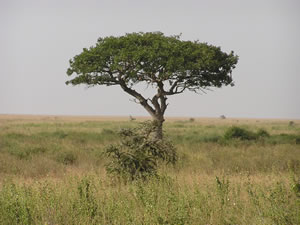Thinking About Trees
|
 Natural
forests once covered almost two thirds of the earth's land surface,
but we have changed all that. Human activities to create new land for
farming, for logging and timber products, for new ranch lands, and so
on, have reduced this figure to about one third. Yet the process continues
apace to this day, so that many of our forests now survive only on slopes
or soils considered unsuitable for agriculture. Kenya's forests, for
example, cover less than 3% of its land surface, far below the percentage
generally thought to be necessary by the experts - and Nature strains
to keep its balance. Our attitude to trees has been nothing less than
dismissive. Natural
forests once covered almost two thirds of the earth's land surface,
but we have changed all that. Human activities to create new land for
farming, for logging and timber products, for new ranch lands, and so
on, have reduced this figure to about one third. Yet the process continues
apace to this day, so that many of our forests now survive only on slopes
or soils considered unsuitable for agriculture. Kenya's forests, for
example, cover less than 3% of its land surface, far below the percentage
generally thought to be necessary by the experts - and Nature strains
to keep its balance. Our attitude to trees has been nothing less than
dismissive. |
But not entirely. As a poet once wrote; "I do not think anything in Nature is more mysterious and affecting than a big tree. It is not only that so much proceeds from so little, though this aspect of it is a supreme example of Nature's method of turning thin air into hard lofty substance: there is something more about a great tree. Standing under this one and looking up, with knitted concentration, quite baffled, I get the impression that it emanated - Goodness. It stood there firmly like a noble Thought, which, if understood would save the world." (1) Thus mused the poet, working as a woodsman, when he rested in the shade of a tree from the heat of the day, expressing a thought no doubt shared by many throughout history. For the benevolent shade, and the protection from the heat is just one of the ways that trees affect our everyday lives. They do a thousand and one things for us in a silent, patient, and dependable way. Sometimes in that silence, we even fail to notice their presence at all. Yet without the trees the state of our lives would be far harsher than it is. The recognition by many that trees are disappearing too fast sets off alarm bells. We need the trees more than they need us. We need trees and the products they provide for our use: firewood, charcoal, poles, timber, food, fodder, fencing, windbreaks, shelter, mulch, green manure, medicine, fiber, gums and resins, and much more. Their beauty adds to our visual pleasure with our surroundings, enhancing our feelings of well being. Roadways are somehow more peaceful when trees line the route. Trees affect our lives and environment in other ways as well, as we have known for generations. "In the old days," some Kikuyu elders told two English anthropologists, "there were many big trees and few people - and much rain. Now the big trees are all dead and like earth, so there is little rain. These are the words of the ancient men, we share with you." This was recorded for us in 1904, near Nyeri, and the researchers went on to comment that nevertheless the process was continuing, and even accelerating, since the coming of the colonialists. "It has gone on under our own eyes in a manner that is heartbreaking to witness, more especially in the river ravines where the damage done is irreparable." (2) For nearly one hundred years we have continued to ignore that ancient wisdom, perhaps because we are only just beginning to understand it. NOTES 1. John Stewart Collis, 'The Worm Forgives The Plough', Penguin Books, London, 1975. 2. W. S. and K. Routledge, 'The Akikuyu of British East Africa', Edward Arnold, London, 1910. |